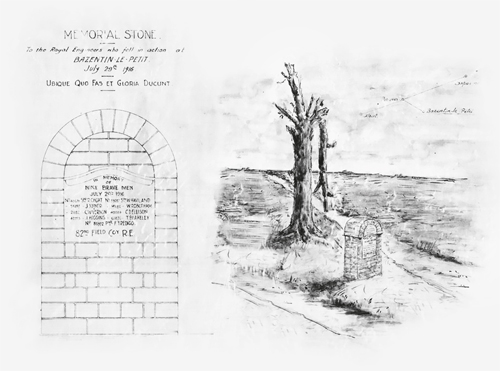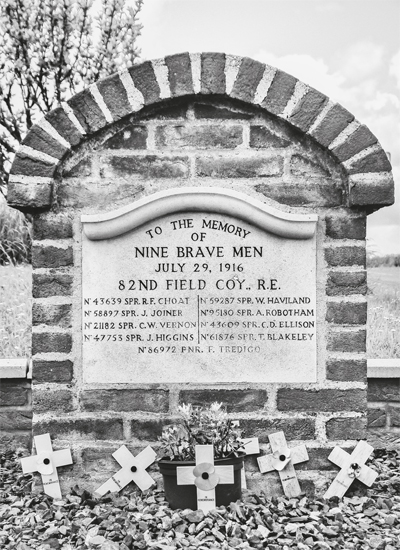
#61876 Sapper Thomas Blakeley
82ND FIELD COMPANY, ROYAL ENGINEERS
THOMAS BLAKELEY WAS A CARPENTER and joiner in his early thirties from Lancashire. Enlisting at home in Preston, he was quickly singled out for the Royal Engineers. Leaving his wife Harriet and two little boys, aged 6 and 2, Thomas sailed for France in July 1915 with the 82nd Field Company.
On 29th July, he and his section were hard at work at a junction on the road from Bazentin-le-Petit and Longueval, south of High Wood. The infantry of 19th Division, to which the field company belonged, had been sorely tried by enemy artillery throughout the previous week. Lacking cover, the sappers had gone out to help dig new trench lines, but under dangerous circumstances they could not make them deep enough for occupation. While infantry rotated in and out of the lines on the 29th, after dark Thomas was out forming dumps of barbed wire for later use on their front before he moved to take up work at Crucifix Corner, a dangerously exposed spot to the rear. There was heavy fighting going on at High Wood to the north that night and shelling was prevalent. Finishing work, the men split up into small groups of three or four, a contingency designed to minimise casualties if stray ordnance came their way. No sooner had they separated for the walk home, than a shell plunged into the middle of Thomas’ section, impacting a much wider area and causing two dozen casualties.

Plans for the Nine Brave Men Memorial. (Courtesy of the Commonwealth War Graves Commission)

The Nine Brave Men Memorial featuring Sapper Thomas Blakeley’s name. (Andrew Holmes)
Several men were simply obliterated, including 34-year-old Thomas. Attempts were made to find them the following day, but all that was discovered was a loose, gruesome collection of indeterminable body parts where the men had been walking.
Before the company left the area, an officer marked the spot and vowed to return and put up something in memory of the men killed. He later had a stone engraved at the Divisional Workshop and in 1917, using bricks from nearby ruins, a memorial was built to the six killed on 29th July, Thomas among them, and three other members of the company.
Thomas’ younger son, John, also died during the war, aged 5, during the influenza epidemic raging at the end of 1918. Harriet was with him as he passed away and spent 11th November 1918 not celebrating peace but registering the death of her little boy. With no remains to be buried, as well as on the Nine Brave Men memorial, her husband Thomas was commemorated on the Thiepval Memorial, Pier & Face 8a/8d.